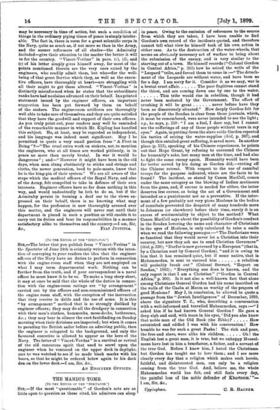THE MARDI'S TOMB.
[TO THE EDITOR OF THE "SPECTATOR.")
Sin,—If the most "questionable" of Gordon's acts are so little open to question as those cited, his admirers can sleep
in peace. Owing to the omission of references to the source from which they are taken, I have been unable to find Gordon's own record of the incidents quoted, and therefore cannot tell what view he himself took of his own action in either case. As to the destruction of the water-wheels, that seems an obviously necessary act of warfare to bring about the submission of the enemy, and is very similar to the starving out of a town. He himself records (" Colonel Gordon in Central Africa," p. 263) how he seized the wells of the "Leopard "tribe, and forced them to come in :—" The detach- ment of the Leopards are without water, and have been so for a day. I am sorry for it. Consider it as we may, war is
a brutal cruel affair The poor fugitives cannot stand the thirst, and are coming down one by one to the water.
This tribe would rise in rebellion, though it had never been molested by the Government. The effect of
crushing it will be great never before have they been so disastrously situated." How deeply Gordon felt for the people of the Soudan is clear from these journals, which, it must be remembered, were never intended to see the light; e.g., he says, p. 259: "I am a fool, I dare say, but I cannot see the sufferings of any of these people without tears in my eyes." Again, in putting down the slave raids Gordon repeated his tactics of seizing the water-supplies (ibid, p. 367), and though this entailed great suffering, it saved more. In another place (p. 113), speaking of his Chinese experiences, he points out that Hope Grant, by refusing to surround the Chinese for humanity's sake, lost many men at the time, and had also to fight the same enemy again. Humanity would have been far better served by his doing as Gordon did,—cutting off the Chinese retreat. With respect to the use of cannibal troops for the purpose indicated, where are the facts to be found ? The incident, as stated by Canon MacColl, comes under the same category as the blowing of Indian mutineers from the guns, and, if excuse is needed for either, the latter deserves less excuse, as being the act of a Government and intended as a punishment not as a preventive. If the inter- ment of a few probably not very pious Moslems in the bodies of cannibals prevented the despatch of many hundreds more to Jehanum (or elsewhere) before their time, surely it is an excess of sentimentality to object to the method ? What Canon MacColl says about the possibility of Gordon's conduct in the Soudan lowering the name and character of Christians in the eyes of Moslems, is only calculated to raise a smile when we read the following passages :—" The Darfurians were so fanatical that they would never let a Christian into their country, but now they ask me to send Christian Governors'. (ibid, p.239); "Darf ar is now governed by a European " (that is, by a Christian sent by General Gordon), "and it is owing to him that it has remained quiet, but if some native, that is Mahommedan, is sent to succeed him a rebellion will probably break out" (Colonel Stewart, "Report on Soudan," 1883) ; "Everything one does is known, and the only regret is that I am a Christian" (" Gordon in Central Africa," p. 300). Is it not also a well-known fact that alone among Christians General Gordon had his name inscribed on the walls of the Caaba at Mecca as worthy of the prayers of good Moslems ? May I, in conclusion, be allowed to quote a passage from the "Jewish Intelligences" of December, 1889, above the signature T. Z., who, describing a conversation with a well-informed and travelled Mahommedan, says :—" I asked him if he had known General Gordon ? He gave a deep sigh and said, with tears in his eyes, 'Did you also know
that noble man of the Old Book (the Bible)? How astonished and edified I was with his conversation ! How humble he was for such a great Pasha! The rich and poor,
the free and slave, were alike his children Oh! the English lost a great man, it is true, but we unhappy Mussul- mans have lost in him a benefactor, a father, and a servant of the true God. Before I knew him, I hated the Christians, but Gordon has taught me to love them ; and I see more clearly every day that a religion which makes such heroic, faithful, and disinterested men, can only be a religion coming from the true God. And, believe me, the whole Mahommedan world has felt, and still feels every day, the painful loss of the noble defender of Khartoum.'
I am, Sir, lac.,















































 Previous page
Previous page